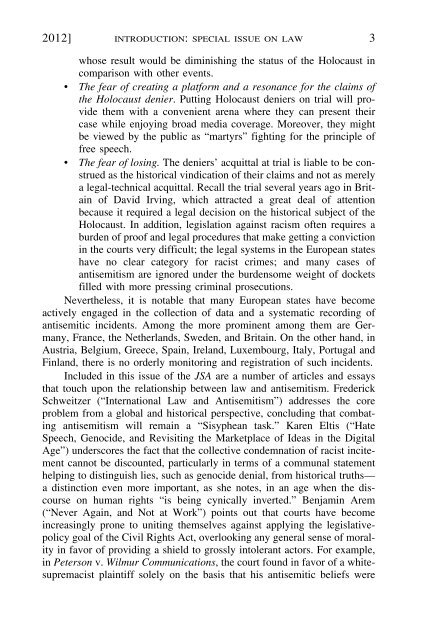Volume 4 No 1 - Journal for the Study of Antisemitism
Volume 4 No 1 - Journal for the Study of Antisemitism
Volume 4 No 1 - Journal for the Study of Antisemitism
You also want an ePaper? Increase the reach of your titles
YUMPU automatically turns print PDFs into web optimized ePapers that Google loves.
2012] INTRODUCTION: SPECIAL ISSUE ON LAW 3<br />
whose result would be diminishing <strong>the</strong> status <strong>of</strong> <strong>the</strong> Holocaust in<br />
comparison with o<strong>the</strong>r events.<br />
• The fear <strong>of</strong> creating a plat<strong>for</strong>m and a resonance <strong>for</strong> <strong>the</strong> claims <strong>of</strong><br />
<strong>the</strong> Holocaust denier. Putting Holocaust deniers on trial will provide<br />
<strong>the</strong>m with a convenient arena where <strong>the</strong>y can present <strong>the</strong>ir<br />
case while enjoying broad media coverage. Moreover, <strong>the</strong>y might<br />
be viewed by <strong>the</strong> public as “martyrs” fighting <strong>for</strong> <strong>the</strong> principle <strong>of</strong><br />
free speech.<br />
• The fear <strong>of</strong> losing. The deniers’ acquittal at trial is liable to be construed<br />
as <strong>the</strong> historical vindication <strong>of</strong> <strong>the</strong>ir claims and not as merely<br />
a legal-technical acquittal. Recall <strong>the</strong> trial several years ago in Britain<br />
<strong>of</strong> David Irving, which attracted a great deal <strong>of</strong> attention<br />
because it required a legal decision on <strong>the</strong> historical subject <strong>of</strong> <strong>the</strong><br />
Holocaust. In addition, legislation against racism <strong>of</strong>ten requires a<br />
burden <strong>of</strong> pro<strong>of</strong> and legal procedures that make getting a conviction<br />
in <strong>the</strong> courts very difficult; <strong>the</strong> legal systems in <strong>the</strong> European states<br />
have no clear category <strong>for</strong> racist crimes; and many cases <strong>of</strong><br />
antisemitism are ignored under <strong>the</strong> burdensome weight <strong>of</strong> dockets<br />
filled with more pressing criminal prosecutions.<br />
Never<strong>the</strong>less, it is notable that many European states have become<br />
actively engaged in <strong>the</strong> collection <strong>of</strong> data and a systematic recording <strong>of</strong><br />
antisemitic incidents. Among <strong>the</strong> more prominent among <strong>the</strong>m are Germany,<br />
France, <strong>the</strong> Ne<strong>the</strong>rlands, Sweden, and Britain. On <strong>the</strong> o<strong>the</strong>r hand, in<br />
Austria, Belgium, Greece, Spain, Ireland, Luxembourg, Italy, Portugal and<br />
Finland, <strong>the</strong>re is no orderly monitoring and registration <strong>of</strong> such incidents.<br />
Included in this issue <strong>of</strong> <strong>the</strong> JSA are a number <strong>of</strong> articles and essays<br />
that touch upon <strong>the</strong> relationship between law and antisemitism. Frederick<br />
Schweitzer (“International Law and <strong>Antisemitism</strong>”) addresses <strong>the</strong> core<br />
problem from a global and historical perspective, concluding that combating<br />
antisemitism will remain a “Sisyphean task.” Karen Eltis (“Hate<br />
Speech, Genocide, and Revisiting <strong>the</strong> Marketplace <strong>of</strong> Ideas in <strong>the</strong> Digital<br />
Age”) underscores <strong>the</strong> fact that <strong>the</strong> collective condemnation <strong>of</strong> racist incitement<br />
cannot be discounted, particularly in terms <strong>of</strong> a communal statement<br />
helping to distinguish lies, such as genocide denial, from historical truths—<br />
a distinction even more important, as she notes, in an age when <strong>the</strong> discourse<br />
on human rights “is being cynically inverted.” Benjamin Arem<br />
(“Never Again, and <strong>No</strong>t at Work”) points out that courts have become<br />
increasingly prone to uniting <strong>the</strong>mselves against applying <strong>the</strong> legislativepolicy<br />
goal <strong>of</strong> <strong>the</strong> Civil Rights Act, overlooking any general sense <strong>of</strong> morality<br />
in favor <strong>of</strong> providing a shield to grossly intolerant actors. For example,<br />
in Peterson v. Wilmur Communications, <strong>the</strong> court found in favor <strong>of</strong> a whitesupremacist<br />
plaintiff solely on <strong>the</strong> basis that his antisemitic beliefs were














